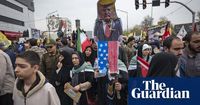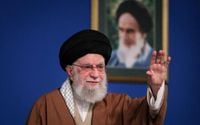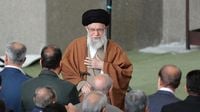In a dramatic escalation of tensions between Iran and the United States, Iranian officials have reacted strongly to President Donald Trump’s recent threats regarding military action against the Islamic Republic. On March 30, 2025, Trump warned that if Iran did not agree to U.S. demands concerning its nuclear program, "there will be bombing. It will be bombing the likes of which they have never seen before." This statement has sparked outrage in Tehran, prompting a swift diplomatic response.
Iran's Foreign Ministry condemned Trump’s remarks as a "clear contradiction to the essence of international peace and security." Spokesperson Esmail Baghaei stated, "The explicit threat of bombing Iran by the head of a country is a gross violation of the United Nations charter and a violation of the International Atomic Energy Agency safeguards regime. Violence brings violence and peace creates peace; America can choose." This sentiment underscores Iran's determination to resist external pressure while also signaling a willingness to engage in dialogue under the right circumstances.
In a related development, Iran's Supreme Leader, Ayatollah Ali Khamenei, expressed that while the nation is "not overly concerned" by Trump’s threats, any malicious act would be met with a "firm and decisive response." Khamenei's comments reflect a broader strategy of defiance against perceived aggression from the U.S. and its allies.
Ali Larijani, an adviser to Khamenei, further emphasized Iran's defensive posture during a state television interview. He stated, "We are not moving towards (nuclear) weapons, but if you do something wrong in the Iranian nuclear issue, you will force Iran to move towards that because it has to defend itself." This declaration highlights the precarious balance Iran seeks to maintain between its nuclear ambitions and its international obligations.
Trump’s threats follow his recent diplomatic overtures, including a letter sent to Khamenei proposing talks about Iran's nuclear program. The letter, delivered by a senior diplomatic envoy from the United Arab Emirates, has reportedly been acknowledged by Iranian officials. Iran's Foreign Minister Abbas Araghchi confirmed that a response had been sent through intermediaries in Oman, indicating a willingness to engage in indirect negotiations.
Despite this potential for dialogue, the atmosphere remains fraught with tension. Trump has set a mid-May deadline for progress, with a longer deadline of mid-August looming, by which time the original 2015 nuclear agreement will largely expire. The U.S. withdrawal from this landmark deal in 2018 has been widely criticized, as it led Iran to accelerate its uranium enrichment activities.
In a further display of defiance, Brigadier General Amir Ali Hajizadeh, the commander of Iran’s aerospace force, remarked, "Someone in glass houses does not throw stones at anyone," referring to the U.S. military presence in the region, which includes at least 10 bases and 50,000 troops. This metaphor underscores the perceived hypocrisy of U.S. threats in light of its own military capabilities.
As tensions continue to escalate, the international community watches closely. Iran's UN ambassador, Amir Saeid Iravani, has sent a letter to the UN Security Council condemning what he termed "warmongering provocations" from the U.S. He stated that Iran would respond "swiftly and decisively to any act of aggression or attack by the United States or its proxy, the Israeli regime." This statement signals Iran's readiness to defend its sovereignty against perceived external threats.
Moreover, Iranian officials have indicated that the U.S. demands in negotiations may extend beyond nuclear issues. Mohammad Kazem al-Sadegh, Iran's ambassador to Iraq, suggested that the U.S. is also seeking the disbandment of Iranian-backed militias in Iraq, complicating the negotiation landscape further.
The division within the U.S. administration regarding its approach to Iran adds another layer of complexity. While some officials, including National Security Adviser Mike Waltz, advocate for the "full dismantlement" of Iran's nuclear program, others argue for more limited restrictions. This internal discord reflects the broader challenges facing U.S. foreign policy in the region.
As the situation unfolds, the potential for conflict remains a pressing concern. Trump’s administration appears divided on whether to pursue military action or diplomatic engagement, with some believing an attack could lead to regime change in Iran. However, widespread opposition to military action from Gulf states, who fear further instability, may temper such ambitions.
The coming weeks will be crucial as both nations navigate this high-stakes diplomatic landscape. With deadlines looming and tensions on the rise, the potential for miscalculation remains significant. As both sides weigh their options, the world watches closely, hoping for a resolution that avoids further escalation.







